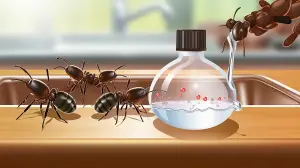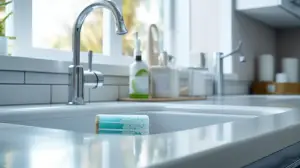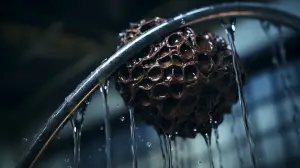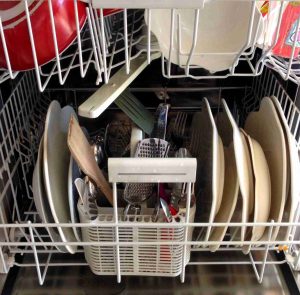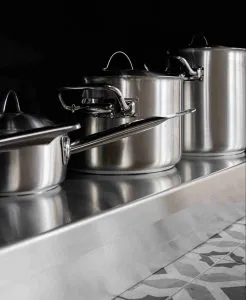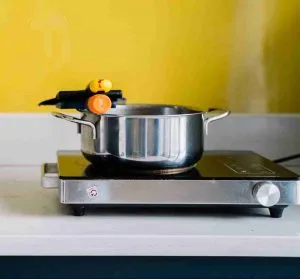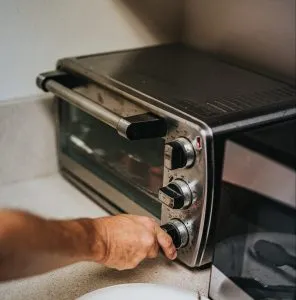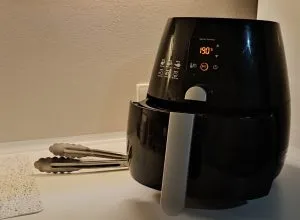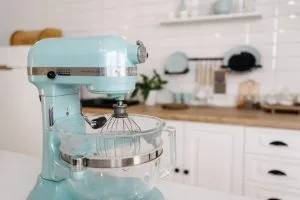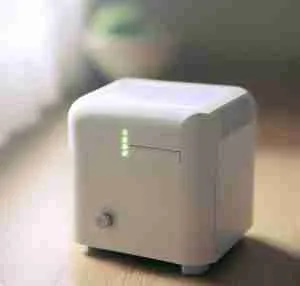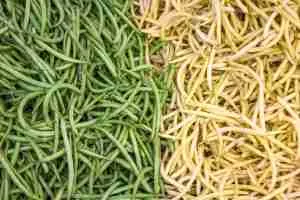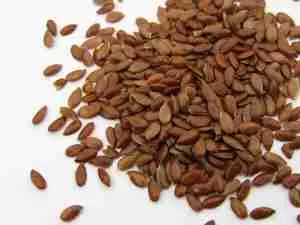Are you struggling with very tiny ants around the sink invading your kitchen? This is a common issue many homeowners face, as highlighted in our comprehensive guide on bugs in the house.
Don’t worry, I’ve got you covered with practical and safe methods to combat these pesky pests.
Contents
ToggleKey Takeaways:
- Identify the ant species and understand their behavior to effectively address the problem.
- Use food-grade diatomaceous earth as a natural ant trap that dries out and kills the ants.
- Mix boric acid with sugar or honey to attract and poison ants.
- Clean surfaces with dish soap to eliminate pheromone residue that attracts ants.
- Pour boiling water into ant holes near the home to kill off the majority of the colony.
Identifying the Type of Ant Across Your Kitchen Counter and Their Behavior
Before taking any action, it’s crucial to identify the species of ants you’re dealing with and understand their behavior patterns. This knowledge will help you effectively address the ant problem in your kitchen. Tiny ants in the kitchen sink or around the house can belong to various species, such as sugar ants, pharaoh ants, or ghost ants. Identifying the species will guide you in choosing the most appropriate methods to eliminate them.
One way to identify the ant species is by observing their physical characteristics. Take note of the ant’s size, color, and body shape. You can use a magnifying glass for a closer examination.
Additionally, observe their behavior. Are they trailing in a straight line or moving erratically? Are they attracted to sugary substances or protein-rich foods? Understanding their preferences will help you set effective traps or bait.
If you’re uncertain about the ant species, you can consult a pest control professional who can conduct a thorough inspection and provide accurate identification. Similarly, if you’re dealing with spiders, our guide on how to get rid of spiders in the basement can be of great help.
Remember, knowing the ant species and their habits is the first step towards successfully combating tiny ants in your kitchen. By identifying them correctly, you can tailor your approach and choose the most suitable methods to eliminate the ant infestation.
| Common Ant Species | Characteristics |
|---|---|
| Sugar Ants | – Small, usually brown or black – Attracted to sugar and sweet foods – Often found near food sources – Form trails in search of food |
| Pharaoh Ants | – Very small, light yellow or reddish – Attracted to both sugar and protein – Nest in warm, humid areas – Can establish multiple colonies |
| Ghost Ants | – Extremely tiny, pale or translucent – Attracted to sweet foods and grease – Nest in hidden areas like wall voids – Quick and erratic movement patterns |
Home Remedies to Get Rid of Tiny Ants Around Your Kitchen Sink

Let’s explore some easy-to-implement home remedies that can help you eliminate tiny ants around your sink without resorting to harmful chemicals. Identifying the ant species invading your kitchen is crucial to understanding their behavior and implementing the most effective solution. One popular home remedy is using food-grade diatomaceous earth, which acts as a natural ant trap. It works by drying out the ants, ultimately leading to their demise.
Another remedy is boric acid mixed with sugar or honey, which acts as both an attractant and a poison for ants. The ants are drawn to the sweetness of the mixture and ingest the boric acid, which ultimately kills them. However, it’s important to keep this mixture away from children and pets, as boric acid can be toxic if ingested in large quantities.
On a related note, if you’re curious about whether LED lights attract spiders, we’ve explored that topic as well.
In addition to these remedies, dish soap can be an effective tool in eliminating ants around your kitchen sink. By cleaning surfaces with dish soap, you can remove pheromone residue that attracts ants, disrupting their trail and deterring them from returning. If you want to tackle the ant colony directly, pouring boiling water into the ant holes near your home can significantly reduce their population.
For more kitchen cleaning tips, check out our guide on how to clean a kitchen sink drain.
While home remedies can be effective, you may also consider using commercial ant traps or natural ant killers. These products are specifically designed to eliminate ants, offering a convenient and targeted solution. Just make sure to follow the instructions carefully and keep them out of reach of children and pets.
| Home Remedies | Effectiveness |
|---|---|
| Diatomaceous Earth | Effective in drying out and killing ants |
| Boric Acid | Acts as an attractant and poison for ants |
| Dish Soap | Eliminates pheromone residue and disrupts ant trails |
| Boiling Water | Kills off a significant portion of the ant colony |
To prevent future ant infestations, it is essential to seal entry points in your kitchen. This can be achieved by caulking gaps in windows and doors, keeping food tightly sealed, and maintaining a clean and clutter-free environment. By implementing these preventive measures, you can ensure that tiny ants stay away from your kitchen sink in the long run.
Utilizing Pest Control: Commercial Ant Traps and Natural Solutions for Kitchen Ants
If home remedies alone are not enough, there are several commercial ant traps and natural ant killers available that can effectively eliminate the ant problem in your kitchen. These products are designed to specifically target ants and provide a more potent solution to eradicate them from your space.
One popular option is commercial ant traps, which come in the form of bait stations. These bait stations contain a sweet, sugary substance that attracts ants. Once they enter the trap, they consume the bait and carry it back to the colony. This method is effective in eliminating the entire ant colony, including the queen, making it a comprehensive solution.
Natural ant killers are another alternative that can be used to combat the ant problem in your kitchen. These natural remedies typically consist of ingredients like essential oils or botanical extracts that have insecticidal properties. They are safer for use around children and pets, while still being effective in killing ants.
Using Essential Oils as Natural Ant Killers.
One popular natural ant killer is peppermint oil. Ants are repelled by the strong scent of peppermint, making it an excellent deterrent. To use peppermint oil, simply mix a few drops with water in a spray bottle and spray it along ant trails, entry points, and areas where ants are commonly seen. This will help deter them from entering your kitchen.
- Lemon juice is another natural ant killer that can be easily found in your kitchen. The acidity of lemon juice disrupts the ants’ pheromone trails, making it difficult for them to navigate and coordinate. Simply squeeze fresh lemon juice along the ant trails and wipe down surfaces to deter ants.
- Vinegar is a multipurpose cleaning agent that can also be used as a natural ant killer. Its strong scent masks the ants’ pheromone trails and disrupts their communication. Mix equal parts of vinegar and water in a spray bottle and use it to clean surfaces, floors, and countertops to repel ants.
By using commercial ant traps or natural ant killers, you can effectively eliminate the ant problem in your kitchen. It is important to follow the instructions provided with the product and take necessary precautions to ensure the safety of yourself, your family, and your pets. Remember, prevention is key, so be sure to seal entry points to avoid future ant infestations in your kitchen.
| Product | Usage | Effectiveness |
|---|---|---|
| Commercial ant traps | Place bait stations along ant trails and entry points | Effective in eliminating entire ant colonies, including the queen |
| Natural ant killers | Use essential oils or botanical extracts to repel ants | Safer for use around children and pets, while still being effective |
Sealing Entry Points to Prevent Ant Infestations in Your Kitchen

To ensure long-term prevention of ant infestations around your kitchen sink, it’s essential to seal entry points and take preventive measures against future invasions. By blocking off the areas where ants can enter your kitchen, you can effectively deter them from returning and creating a nuisance in your food preparation area.
Start by thoroughly inspecting the area around your kitchen sink for any cracks, gaps, or holes that ants could use as entry points. Common entry points include gaps around pipes, cracks in walls or baseboards, and openings under doors or windows. Seal these areas using caulk or silicone sealant, ensuring a tight seal to prevent ants from squeezing through. For larger gaps or openings, consider using expanding foam insulation for a more secure barrier.
In addition to sealing entry points, it’s important to keep your kitchen clean and free of food debris that can attract ants. Wipe down your kitchen countertops and sink regularly, making sure to clean up any spills or crumbs promptly. Store food in airtight containers and avoid leaving pet food or water dishes out for extended periods. By removing potential food sources, you make your kitchen less appealing to ants.
| Preventive Measures | Benefits |
|---|---|
| Create a clean and tidy environment | Reduce food sources for ants |
| Seal entry points | Prevent ants from entering your kitchen |
| Install door sweeps and window screens | Block off additional entry points |
| Trim tree branches and shrubs | Prevent ants from accessing your home from outdoor areas |
Installing door sweeps and window screens can provide an extra layer of defense against ant invasions. These barriers can stop ants from entering through gaps under doors or open windows, reducing the likelihood of infestation. Additionally, regularly trimming tree branches and shrubs near your home can help deter ants from accessing your kitchen through outdoor pathways.
Conclusion
By following the methods and tips shared in this article, you can combat very tiny ants around your kitchen sink easily and safely, enjoying a cleaner and ant-free kitchen.
Identifying the ant species and understanding their behavior is crucial in effectively addressing the ant problem in your kitchen. Once you know what you’re dealing with, you can choose the most appropriate method for elimination.
Home remedies such as food-grade diatomaceous earth, boric acid mixed with sugar or honey, dish soap, and boiling water can be used to eradicate ants and prevent their return. These natural and readily available solutions are safe for household use.
If the infestation persists, commercial ant traps and natural ant killers are additional resources to consider. They can be effective in eliminating the ant colony invading your kitchen sink.
To prevent future ant infestations, sealing entry points is essential. By blocking off their access to your kitchen, you can drastically reduce the chances of new ant colonies appearing.
FAQ
1. How can I get rid of ants in my kitchen?
If you want to get rid of ants in your kitchen, there are several steps you can take. First, make sure to keep your kitchen clean and free of crumbs or food debris that might attract ants. Next, seal any entry points such as cracks or gaps in walls, floors, or windows where ants can enter. Additionally, you can use ant baits or natural repellents to eliminate the ants.
2. What should I do if I have tiny ants in my kitchen?
If you have tiny ants in your kitchen, you can try using a mixture of vinegar and water to clean your kitchen surfaces. This helps remove the scent trails that ants leave behind, disrupting their communication and foraging patterns. Also, make sure to store your food in airtight containers to stop ants from accessing it.
3. How can I prevent ants from entering my kitchen?
To stop ants from entering your kitchen, it is important to keep your kitchen clean and dry. Wipe down countertops regularly, sweep the floors, and promptly clean up any spills or crumbs. Additionally, seal any cracks or gaps in doors, windows, or walls to block potential entry points for ants.
4. What are some common types of ants found in kitchens?
There are several common types of ants that you may find in your kitchen, such as carpenter ants, black ants, odorous house ants, and sugar ants. Each type has different characteristics and behaviors. It is important to identify the specific type of ant to implement the most effective control methods.
5. How can I kill the ants without using harmful chemicals?
If you prefer to avoid using harmful chemicals to kill ants, there are various natural remedies you can try. Some options include using a mixture of water and dish soap, sprinkling cinnamon or coffee grounds near ant trails, or placing cucumber or citrus peels in areas where ants are present. These methods can help repel and deter ants.



